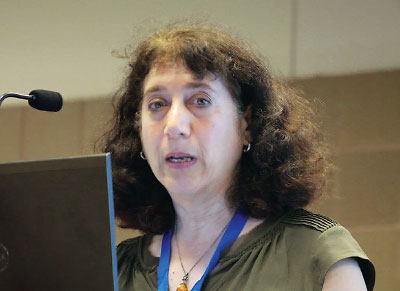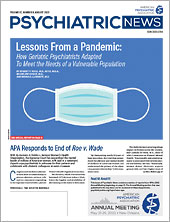Stressful life events—especially interpersonal rejection and loss and academic failure—are predictive of imminent and near-term suicide risk, said Lisa J. Cohen, Ph.D., a professor of psychiatry at the Icahn School of Medicine at Mount Sinai, during a session at APA’s 2022 Annual Meeting on stressful life events and suicide.
Academic failure stands out as an especially strong correlate with suicide, one that may be frequently overlooked by clinicians, Cohen said.
She reported results from the ongoing
Modular Assessment of Risk for Imminent Suicide (MARIS). The study compared psychiatric inpatients and outpatients on the relationship between 22 stressful life events (SLEs) and suicidal thoughts and behavior in the past month and one to two months after patients’ initial assessment. It also compared patient self-reports with retrospective chart review.
She was joined in the session by Megan Rodgers, Ph.D., a postdoctoral fellow at Mount Sinai Beth Israel, who presented data from an international study on stressful life events and suicide during the COVID-19 pandemic, and Fredrik Walby, Psy.D., a faculty member of the University of Oslo, Norway, who presented similar data from the Norwegian Surveillance System for Suicide. The session was chaired by Igor Galynker, M.D., Ph.D., associate chair for research in the Department of Psychiatry at Mount Sinai Beth Israel.
Providing background to the MARIS study, Cohen told attendees that prior research on SLEs and suicide has varied with regard to the populations studied, the SLEs that were considered, and the mode of assessing SLEs.
“Importantly, many studies we found in the literature addressed the total number of SLEs but did not report detailed effects of specific life events on suicide risk,” Cohen said. “Surprisingly, none of these studies included both psychiatric inpatients and outpatients. As psychiatric patients are at grossly elevated risk of suicidal behavior, it is critical to examine the relationship between SLEs and suicide risk in this population.
The MARIS study on which Cohen reported included 328 inpatients and 730 psychiatric outpatients recruited from the New York City hospitals in the Mount Sinai hospital system. Patients were assessed with a battery of instruments including the Columbia-Suicide Severity Rating Scale.
The most frequent SLEs were as follows: major financial crisis (n=247), serious problem with neighbor/friend/relative (n=222), breaking off steady relationship (n=153), serious illness of a close friend or relative (n=149), having a serious illness or injury (n=143), academic failure (n=119), and romantic rejection (n=119).
Across all SLEs, the frequency differed between inpatients and outpatients, sometimes markedly: Among inpatients, marital separation was more than three times as common; and academic failure was nearly twice as common. SLEs also differed by self-report and retrospective chart review, in some cases by a factor of 10.
“Clinicians should be aware that there may be a lot going on [in a patient’s life] that isn’t going into the medical record,” Cohen said.
The SLEs with the strongest correlation with suicidal thoughts or behaviors within a one-month time frame were breaking off a steady relationship followed by academic failure and romantic rejection. Other SLEs highly correlated with suicidal thoughts and behaviors were serious problems witha friend/neighbor/relative, a period of homelessness, physical abuse or assault by someone close, and financial crisis.
“The most common SLEs, endorsed by over 10% of participants, involved financial crises, interpersonal conflict or loss, serious illness or injury, or academic failure or stressors,” Cohen said. “This is consistent with prior literature, which found financial and interpersonal problems to be the most common stressors associated with suicide thoughts and behaviors. But academic stressors receive far less attention in the literature.”
Cohen said the only predictor of suicide after one month was academic failure. “There is evidence of increasing mental health difficulties in college populations, a problem for which there may be multiple causes,” she said. “Significant academic stressors can represent a potent mental health challenge for young adults with immature coping skills.” ■

